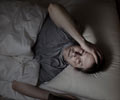Insomnia is the most common sleep disorder in children with Autism Spectrum Disorder (ASD) and affects up to 80% of children with ASD.

‘CBT improved sleep and behavior patterns in ASD kids. Parents of ASD kids also experienced less fatigue and better sleep.’
Read More..




"You can't make yourself sleep better," said Christina McCrae, PhD, professor in the Department of Psychiatry at the MU School of Medicine. "Sleep is a natural process. It's not an intentional activity.Read More..
The first step to curing insomnia for children with ASD involves setting the stage for the circadian clock and the sleep rhythm to work the way they are meant to work."
McCrae's study involved 17 children ages 6 to 12 with ASD who were also diagnosed with insomnia. Seventeen parents of the children also participated in the study.
Both parents and children completed daily electronic sleep diaries which detailed how long it took to fall asleep, total sleep time and other factors.
They also wore electronic devices on their wrists to measure limb movement, which is an objective way to measure sleep quality. Each family completed eight, 50-minute cognitive behavioral therapy sessions with therapists designed to address the barriers preventing sleep.
Advertisement
Following the eight sessions of therapy, data collected from the devices and diaries showed the children who participated showed sleep and behavior improvements.
Advertisement
"We looked at how many sessions the families attended, how well the families understood the treatment, and the subjective and objective outcomes," McCrae said.
"As the paper shows, the outcomes are amazing. While it makes sense that child sleep impacts parental sleep, I didn't expect the parents to see as much improvement as they did in the study."
McCrae hopes to expand this pilot study into a randomized controlled trial with an active control group and a more diverse sample. She also plans to introduce a telehealth version of the cognitive behavioral therapy to assist families in rural areas or those unable to travel.
Source-Eurekalert












